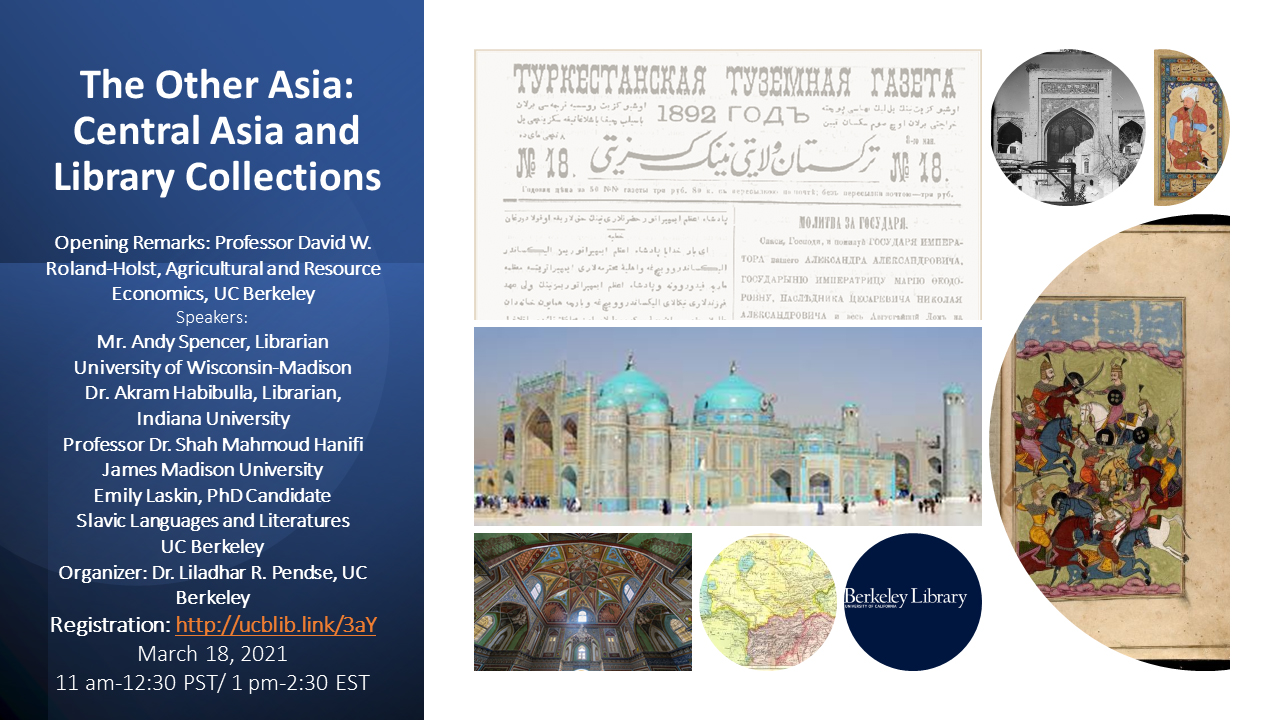Tag: webinar
CRL Webinar-Radical Collaboration: Library Publisher Partnerships to Advance the Global Knowledge Commons
The CRL Webinar are available at the end of this post.
The Global Press Archive Charter Alliance is an initiative by East View Information Services and the Center for Research Libraries to develop a unique series of thematically designed collections to meet the priorities of the CRL members. 74 CRL (including UCB) and NERL libraries have committed $4.25 million to help launch the first three years of the project.
So far, we have access to Mexican Revolutionary Newspapers and Russian Imperial Newspapers as a part of this process.
Independent and Revolutionary Mexican Newspapers
The Independent and Revolutionary Mexican Newspapers collection, with a preliminary release of 135,000 pages from 477 titles, will ultimately include approximately 1,000 titles from Mexico’s pre-independence, independence, and revolutionary periods (1807-1929).
The Imperial Russian Newspapers collection comprises out-of-copyright newspapers spanning the eighteenth, nineteenth, and early twentieth centuries, up to the 1917 Bolshevik Revolution. [1782-1918]
Webinar Recording is below:
A Library Research Journey (Pandemic Edition)
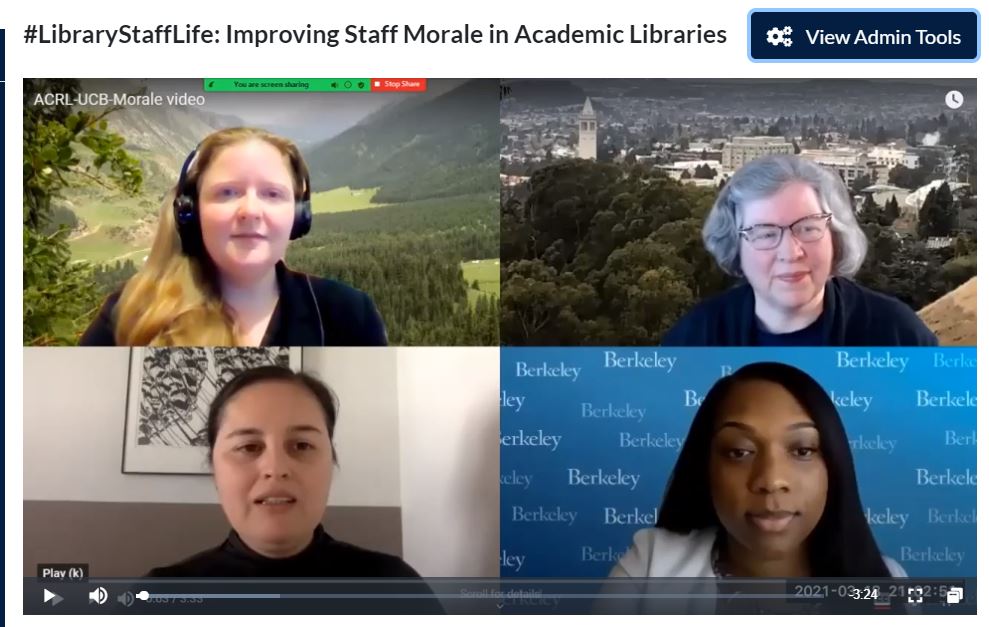
Even beyond those who believe that librarians sit around and read books all day (which would be delightful but is most definitely not our reality), many are surprised to learn that librarians double as active researchers. This is especially true in settings where librarians are members of the faculty, but even where that isn’t the case, such as at Berkeley, librarians are born investigators and it carries over into wanting to find out about and add to knowledge of our settings.
What does it look like to conduct library research? Glad you asked! In our case, it started with a conversation and an idea. Natalia Estrada (now Berkeley’s Political Science and Public Policy Librarian, then the Social Sciences Collection and Reference Assistant and in library school) and I were talking about how much we admired the work of Kaetrena Davis Kendrick. Kendrick wrote a foundational work in the study of librarian workplace morale, The Low Morale Experience of Academic Librarians: A Phenomenological Study, and it sparked many more studies on this topic. But, where were the studies of library staff experiences? We wanted to find out!
We were lucky to recruit two colleagues who added so much to the team: Bonita Dyess, Circulation/Reserves Supervisor at the Earth Sciences/Map Library, and Celia Emmelhainz, Berkeley’s Anthropology & Qualitative Research Librarian. First we applied for (and eventually got) funding for the research from LAUC (the Librarians Association of the University of California). This meant we could pay for transcribing our interviews, give the participants gift cards, and buy qualitative data analysis software. Then we applied for (and got) approval from the IRB (Institutional Review Board), making sure we were complying with processes for research with human subjects.
Here’s where the “pandemic edition” part comes in. All this planning and applying, starting in November 2019, took time; so, at the point we were actually ready to recruit participants, it was April 2020. We were sheltering in place, and not sure how this all would work (although it was probably better than having to go virtual in mid-stream)! Nevertheless, we hurled out information about and invitations to be part of the study to every list-serv, association, and friendly librarian we could think of, nationwide. We ended up doing 34 interviews with academic library staff from a range of locations and institution types (purposefully excluding the UC system), during a three-week period in May-June 2020. Due to COVID these were all online, either by phone or Google Meet (sort of like Zoom), and we asked a structured list of questions, with room for branching into other topics, or diving deeply. Celia trained a wonderful student to transcribe the interviews, and once we had those transcripts and stripped identifying information from them, we were off– coding away (using MAXQDA software), and drawing themes, quotes, recommendations, and other findings from the surprisingly rich information we’d collected.
Next—we had to start getting the information out into the world! Our eventual goal is to write a paper, or several, for publication. There are a number of library and information science journals out there that we are considering… but that takes time as well, and we wanted to start presenting our findings sooner. So, we did an “initial findings” presentation to the UC Berkeley Library Research Working Group, and then stepped into the big time with acceptance to present a poster at the 2021 Association of College and Research Libraries online conference (our poster got almost 600 views), and with a webinar we did for the Pennsylvania Library Association (both the poster and the webinar slides are available through the UC’s eScholarship portal). All our work to get to this point is hopefully now helping others.
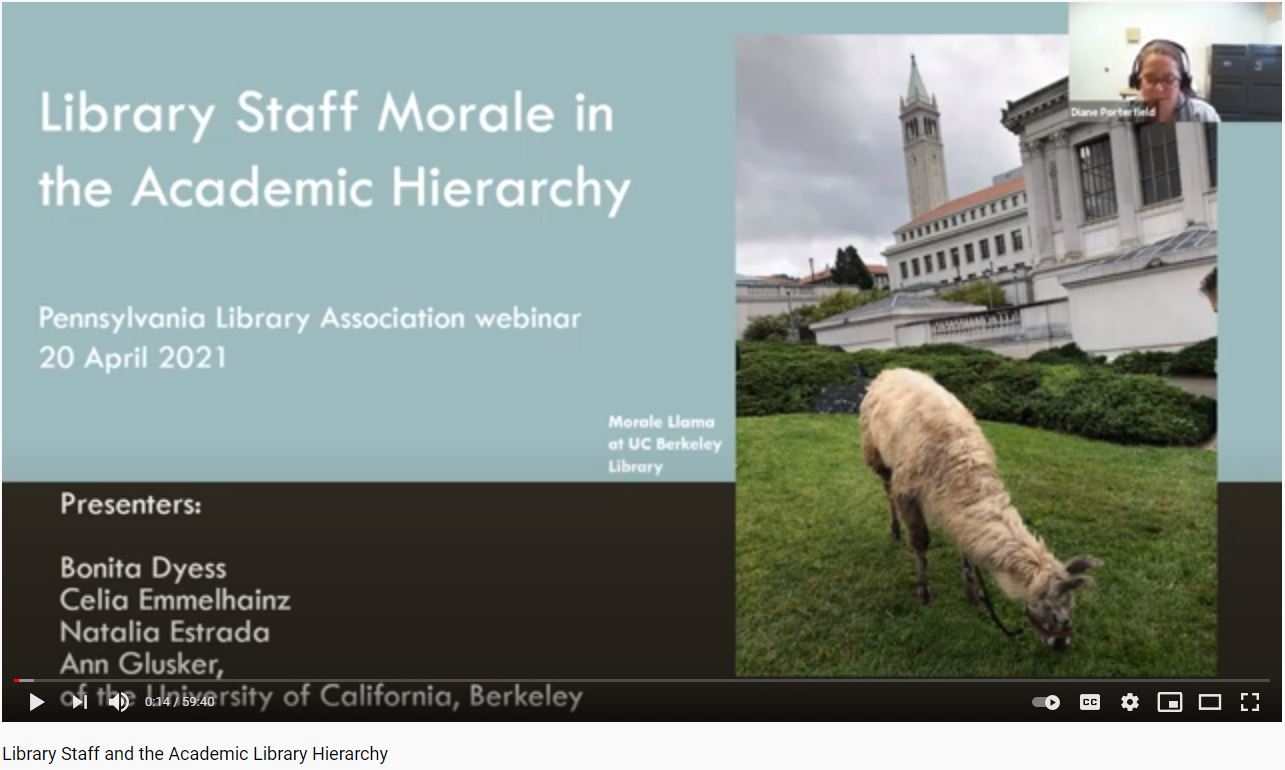
And, a word about connecting with our participants. We were bowled over by their generosity with us and by all they had to say: much that we didn’t expect, and much that they were grateful someone was even asking about. It ended up that we had captured one of the last opportunities to get a snapshot of pre-COVID library staff life; people were still in limbo, and talked about their regular jobs before any lockdowns, for the most part. At that point most expected to be back in their libraries and all to be normal by the end of the summer 2020. We know now that that didn’t happen, and we know that library re-openings and staff roles in them have been challenging and sometimes contentious; we wish we’d known to ask for permission to re-interview our participants—even if only to check in with them. But how could we have known? We wonder how they are.
So now, we have papers to write, and thinking to do about how to take our questions into new avenues of research—because it’s a never-ending, and completely exciting process, and, we suspect, will be very different (easier? or not?) in the post-COVID landscape. Do you have ideas for us? We’d love to hear them! Or want to hear more about our morale study? Please get in touch with us at librarystaffmorale@berkeley.edu!
Announcing a launch of new quarterly webinar series!-Save the Date, March 18, 2021
This event is the first quarterly event in a four-part series entitled “Connecting and collecting to empower.” The series will focus on libraries and library collections from different regions of the globe to highlight the collections, print, and electronic resources from often “forgotten” or “exoticized” parts of our world. No library is an island and as curators, we are often interconnected. It is a known fact that today academic libraries can no longer serve as an archive of all that was printed from a specific region. This series is geared towards students, faculty, and researchers, and the presenters in these webinars will be faculty, academic librarians, curators, researchers, and doctoral students. Each presenter will present how the library’s collections have aided them in their academic pursuits. What were some of the challenges they had to face when they were looking for specific resources and how and if the librarians helped them overcome them?
First Webinar: The Other Asia: Central Asia and Library Collections (Spring 2021)
This 90 minutes webinar is dedicated to various library sources in Central Asia. Often, just like the Great Game in the 19th century, Central Asian Studies library collections are contested and relegated between the North American librarians for East European/ Eurasian Studies and Middle Eastern/ Near Eastern Studies. The US State Department, on the other hand, has attributed Central Asia alongside South Asia. Thus collecting Central Asian materials marks extensive collaboration among various librarians. The speakers at this webinar will speak to their efforts in collaborating to build a sustainable collection at their institutions. In this meeting, they will discuss some of the strategies they have used to develop research-level collections and collaborate with their colleagues in Central Asia. They will also focus on some open access resources.
This zoom event is free and open to all with prior registration here.
Thursday, March 18, 202111 am-12:30 PST/ 1 pm-2:30 EST
Save the date-September 17, 2020: COVID-19: The Caribbean and Latin American Information Professionals and Academic Library Directors Speak!
COVID-19: The Caribbean and Latin American Information Professionals
and Academic Library Directors Speak!
Thursday, Sept. 17
9:30 a.m. PST (USA and Canada)
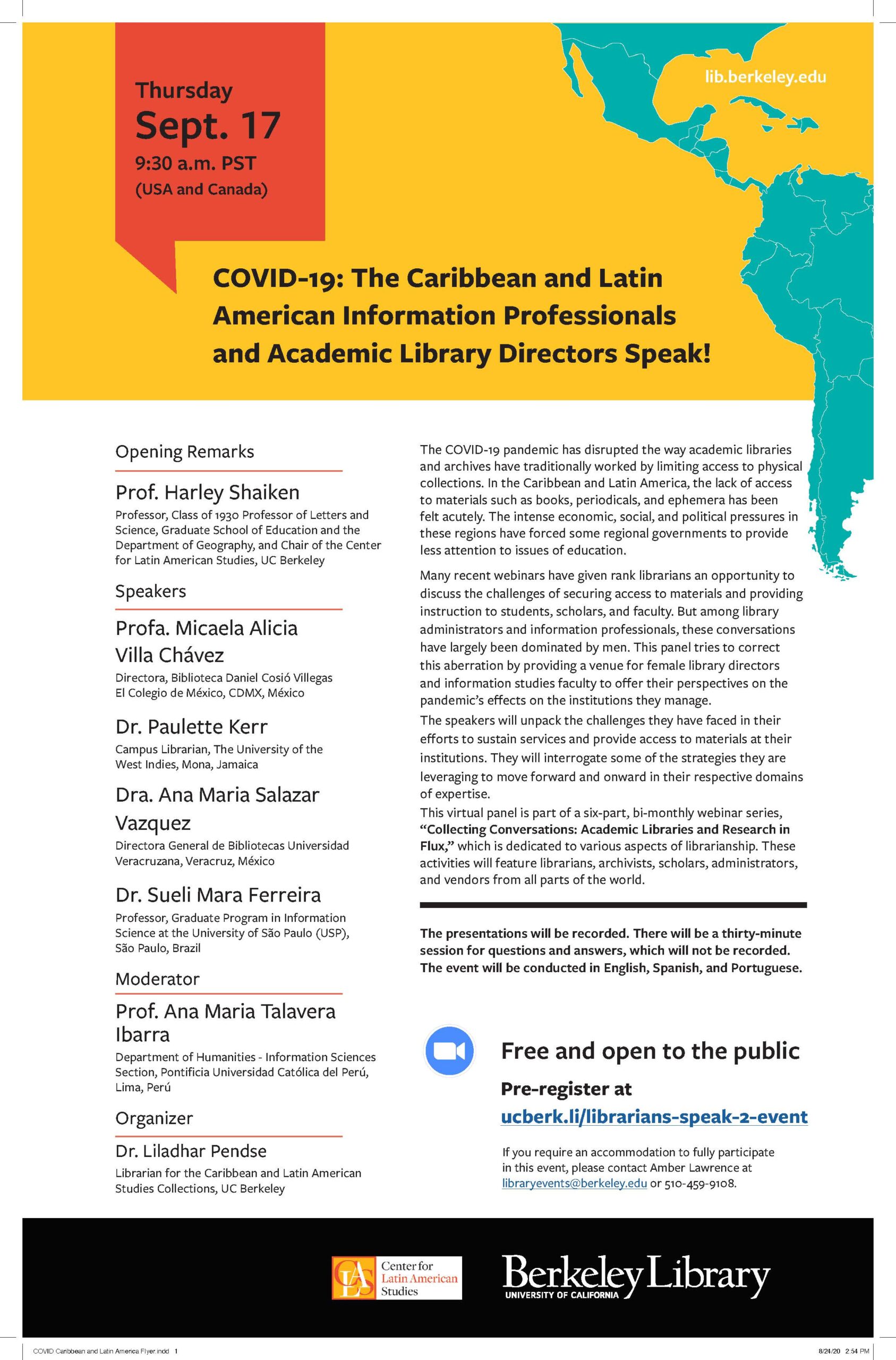
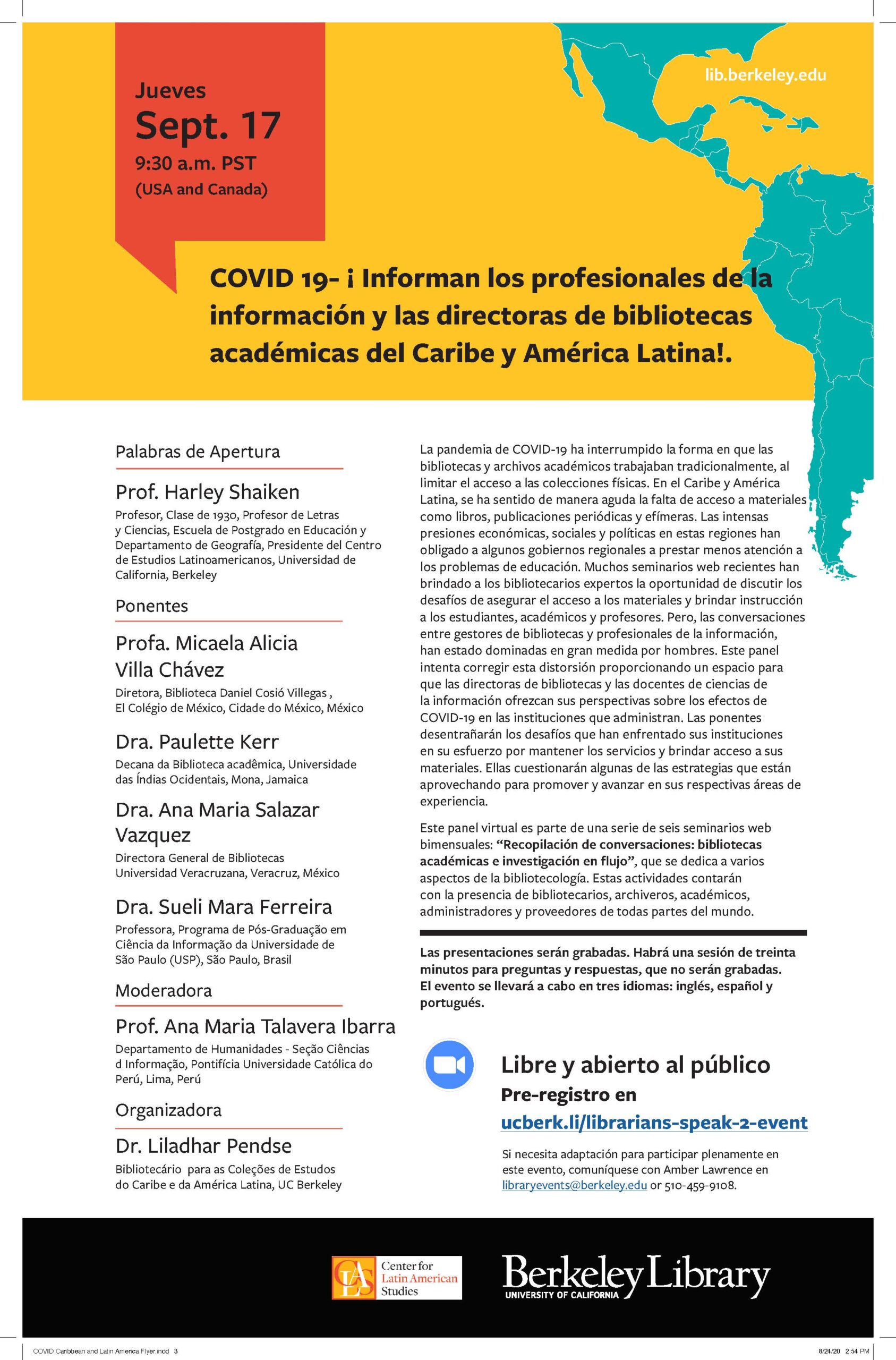
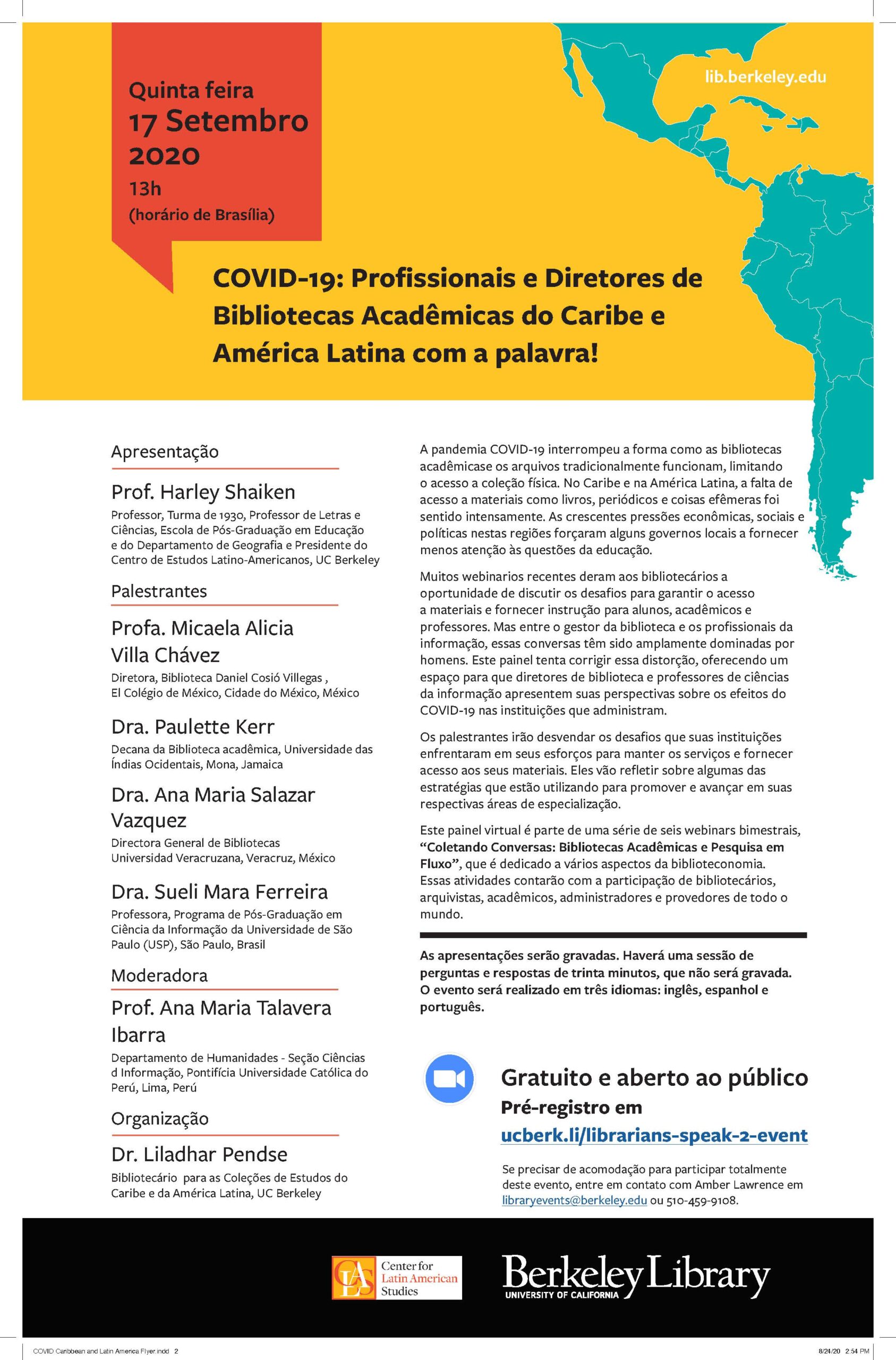
Professional Development: Data Visualization for All
Want to learn how to tell your story and show it with data? This data visualization course will teach you how to design interactive charts and customized maps to illustrate your work.
You’ll start off with easy-to-learn tools, then gradually work our way up to editing open-source code templates with GitHub. You’ll follow step-by-step tutorials with video screencasts, and share your work for feedback on the web. You’ll see real-world examples drawn from Trinity College students working with community organizations in the City of Hartford, Connecticut.
This course is suitable for non-profit organizations, small business owners, local governments, journalists, academics, or anyone who wants to tell their story and show the data. No prior experience is required.
Begins on: Feb 28
Length: 6 weeks
Time involved: 3 hours/week
Price: Free, with a Verified Certificate available for $49
Institution: Trinity college (Hartford, CT)
You can register online for this class here.
How to Get Published in Peer Reviewed Journals: A Webinar
Thinking of writing an article for a peer-reviewed journal? Want to learn effective strategies that will help you to get it published? Then this free webinar may be of interest to you!
Editors and directors from the Public Health Reports present this one-hour webinar to help public health practitioners at the state and local levels turn their work into manuscripts for publication. The speakers will discuss general strategy of what is needed to begin thinking about an article for peer-reviewed literature, how to structure it, how to plan it, how to execute it, and how to position it so that it will be attractive to journals and their peer reviewers.
When: Thursday, Feb 16
Time: 10-11 am Pacific time
You can RSVP online here.
Webinar: East India Company database
Adam Matthew has put together a webinar on the East India Company resource.
Guest Speakers include:
Dr Kate Boehme, University of Sussex – 18:00
Penny Brook, Head of the India Office Records, The British Library – 31:08
Webinar Invitation: The British in India
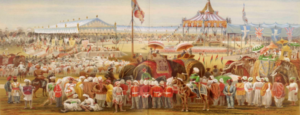 Adam Matthew Digital is hosting a webinar on the British in India, featuring Dr. Kate Boehme, Research Fellow at the University of Sussex. Dr Boehme holds a PhD in History from the University of Cambridge, for which her thesis analysed the development of Indian business networks in and around Bombay in the mid-nineteenth century. Her article “Smuggling India: Deconstructing Western India’s Illicit Export Trade, 1818-1870” was published in the Journal of the Royal Asiatic Society in June 2015.
Adam Matthew Digital is hosting a webinar on the British in India, featuring Dr. Kate Boehme, Research Fellow at the University of Sussex. Dr Boehme holds a PhD in History from the University of Cambridge, for which her thesis analysed the development of Indian business networks in and around Bombay in the mid-nineteenth century. Her article “Smuggling India: Deconstructing Western India’s Illicit Export Trade, 1818-1870” was published in the Journal of the Royal Asiatic Society in June 2015.
They will be using rare primary sources to revisit Britain’s complex involvement in India, from their earliest presence as traders on the Indian subcontinent in the eighteenth century, through to their military governance in the years that followed.
The webinar will be offered twice on August 31, 2016: at 7 am PST and 12 pm PST.
Register at http://amdigital-news.co.uk/2D0N-V909-FS52Y-F6HPA-1/c.aspx
Webinar: Explore primary sources related to commerce and capitalism
The Library subscribes to many digital primary source databases provided by Adam Matthew Digital. The company is offering a free webinar on Wednesday, May 13, that will “provide researchers of consumer culture, trade and commerce, business, advertising, marketing and human geography with a detailed overview of “:
Empire Online
China, America and the Pacific
American Consumer Culture
Global Commodities
The webinar will be offered at two times: 7am and 12pm.
